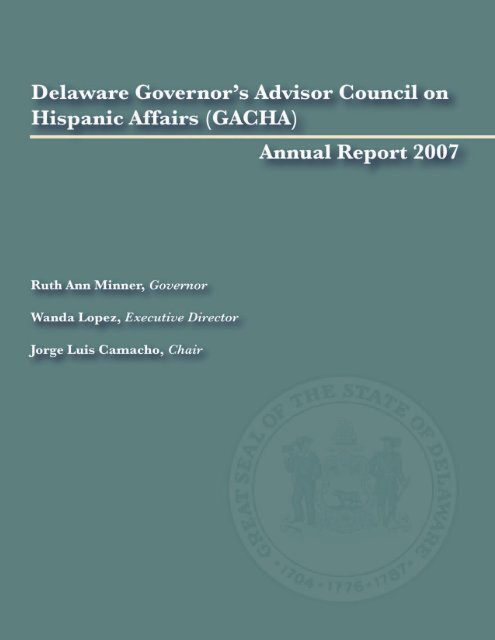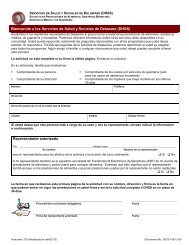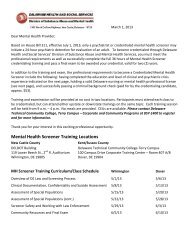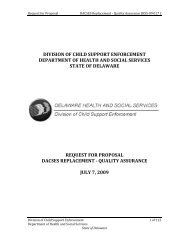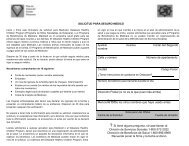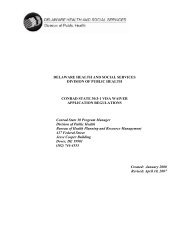D18233 GACHA Annual Report.qxd - Delaware Health and Social ...
D18233 GACHA Annual Report.qxd - Delaware Health and Social ...
D18233 GACHA Annual Report.qxd - Delaware Health and Social ...
You also want an ePaper? Increase the reach of your titles
YUMPU automatically turns print PDFs into web optimized ePapers that Google loves.
<strong>Delaware</strong> Governor’s Advisory Council on<br />
Hispanic Affairs (<strong>GACHA</strong>)<br />
<strong>Annual</strong> <strong>Report</strong> 2007<br />
Ruth Ann Minner<br />
Governor<br />
W<strong>and</strong>a Lopez<br />
Executive Director<br />
Jorge Luis Camacho<br />
Chair
<strong>GACHA</strong> 2007 <strong>Annual</strong> <strong>Report</strong><br />
1<br />
Table of Contents<br />
Message to the Governor..............................................................................................................................2<br />
Members of the Governor’s Advisory Council on Hispanic Affairs ....................................................3<br />
Introduction.....................................................................................................................................................4<br />
Executive Summary........................................................................................................................................5<br />
<strong>GACHA</strong> Initiatives.........................................................................................................................................6<br />
• Education Committee.............................................................................................................................6<br />
• <strong>Social</strong> Justice Committee......................................................................................................................11<br />
• <strong>Health</strong> Committee.................................................................................................................................14<br />
• Economic Development Committee.................................................................................................15<br />
• Community Outreach………………………………………………………….......................18<br />
• National Outreach...…………………………………………………………….....................19<br />
Community Leadership—<strong>GACHA</strong> Members.........................................................................................20<br />
Acknowledgements ......................................................................................................................................24<br />
State of <strong>Delaware</strong> Executive Order ..........................................................................................................25
Message to the Governor<br />
Ruth Ann Minner<br />
Governor<br />
The Honorable Ruth Ann Minner, Governor:<br />
The members of the <strong>Delaware</strong> Governor’s Advisory Council on Hispanic Affairs (<strong>GACHA</strong>) are pleased to<br />
present to you this 2007 <strong>Annual</strong> <strong>Report</strong>. As in past years, this report demonstrates our continued commitment<br />
to serving your administration <strong>and</strong> Hispanic <strong>Delaware</strong>ans. It presents the accomplishments of our four<br />
subcommittees, which represent areas of critical importance to the Hispanic community:<br />
• Education<br />
• <strong>Social</strong> Justice<br />
• <strong>Health</strong><br />
• Economic Development<br />
Through the many partnerships we have formed <strong>and</strong> the many initiatives we have undertaken, we strive to<br />
continue improving the quality of life for Hispanic <strong>Delaware</strong>ans—<strong>and</strong> by doing so, improve the quality of life<br />
for all <strong>Delaware</strong>ans.<br />
Every Council member pledges to continue our work to create a brighter future for all. We are all honored to<br />
have the opportunity to serve on this Council <strong>and</strong> wish to express our gratitude for your consistent support.<br />
W<strong>and</strong>a M. Lopez<br />
<strong>GACHA</strong> Executive Director<br />
Jorge L. Camacho<br />
<strong>GACHA</strong> Chair<br />
Governor’s Advisory Council on Hispanic Affairs<br />
1901 North Dupont Highway<br />
Charles Debnam Building<br />
<strong>Delaware</strong> <strong>Health</strong> & <strong>Social</strong> Services Campus<br />
New Castle, DE 19720<br />
<strong>GACHA</strong> 2007 <strong>Annual</strong> <strong>Report</strong><br />
Vincent P. Meconi, Secretary<br />
<strong>Delaware</strong> <strong>Health</strong> <strong>and</strong> <strong>Social</strong> Services<br />
W<strong>and</strong>a M. Lopez<br />
<strong>GACHA</strong> Executive<br />
Director<br />
Jorge L.<br />
Camacho<br />
<strong>GACHA</strong> Chair<br />
2
<strong>GACHA</strong> 2007 <strong>Annual</strong> <strong>Report</strong><br />
3<br />
Members of the Governor’s Advisory Council<br />
on Hispanic Affairs<br />
Eloy Acosta, <strong>Health</strong> Committee<br />
Nancy Bastidas-Lopez, Economic Development Committee<br />
Maria D. Cabrera, Economic Development Committee Chair<br />
Jorge Camacho, Chair, <strong>GACHA</strong>; <strong>Social</strong> Justice Committee<br />
Cherisse Carlisle, Economic Development Committee<br />
Milton Delgado, <strong>Health</strong> Committee Chair<br />
Michelle Jewel, <strong>Social</strong> Justice Committee<br />
Pastor Israel Figueroa, <strong>Social</strong> Justice Committee<br />
W<strong>and</strong>a Lopez, <strong>GACHA</strong> Executive Director<br />
County Chairs:<br />
New Castle County Chair: Yvette Santiago<br />
Sussex County Chair: Margaret Reyes<br />
Governor’s Advisory Council on Hispanic Affairs<br />
1901 North Dupont Highway<br />
Charles Debnam Building<br />
<strong>Delaware</strong> <strong>Health</strong> & <strong>Social</strong> Service Campus<br />
New Castle, DE 19720<br />
(302) 255-9743<br />
(302) 255-4463 fax<br />
Maria Matos, Co-Chair, Education Committee;<br />
Executive Committee<br />
Representative Joseph Miro, Education Committee<br />
Danny Perez, Economic Development Committee<br />
Edith Prado, <strong>Social</strong> Justice Committee<br />
Eli Ramos, Education Committee<br />
Margaret Reyes, <strong>Social</strong> Justice Committee Chair<br />
Carmen Rivera, Education Committee<br />
Harry J. Sanchez, Education Committee<br />
Yvette Santiago, Co-Chair, Education Committee; Executive<br />
Committee<br />
<strong>GACHA</strong> support:<br />
Keyla Rivero-Rodriguez<br />
Dennis Savage
Introduction<br />
Mission Statement<br />
<strong>GACHA</strong> 2007 <strong>Annual</strong> <strong>Report</strong><br />
The Governor’s Advisory Council on Hispanic Affairs (<strong>GACHA</strong>), formed by an Executive Order signed by Governor Michael<br />
Castle in 1985 <strong>and</strong> reissued by Governor Thomas R. Carper in 1995 (included at the end of this report), has the critical role of advising the<br />
Governor of <strong>Delaware</strong> on issues having an impact on Hispanic <strong>Delaware</strong>ans, as well as linking Hispanic <strong>Delaware</strong>ans with their state<br />
government.<br />
The mission of the Council is to serve as a representative voice on issues <strong>and</strong> concerns pertaining to health, education, social<br />
services, civil <strong>and</strong> human rights, legal <strong>and</strong> legislative matters, employment, finance, <strong>and</strong> any other areas that may impact the equality, service,<br />
<strong>and</strong> treatment of <strong>Delaware</strong>’s Hispanic community. We serve the Governor <strong>and</strong> the people of <strong>Delaware</strong> by fostering the progress of<br />
communication <strong>and</strong> delivery of services to <strong>Delaware</strong>’s Hispanic community.<br />
<strong>GACHA</strong>’s three objectives are focused on service, commitment, <strong>and</strong> dedication. The Council considers its responsibilities to<br />
include the following:<br />
• Staying aware of <strong>and</strong> informed about all aspects of Hispanic life in <strong>Delaware</strong>, by fact-finding, gathering data, requesting reports<br />
from state agencies, <strong>and</strong> commissioning studies.<br />
• Becoming experts on the services provided by the state to Hispanic <strong>Delaware</strong>ans, including life skills, translation services, <strong>and</strong><br />
advocacy.<br />
• Keeping the Governor abreast of issues affecting the Hispanic community in the state, <strong>and</strong> advising the Governor <strong>and</strong> her<br />
cabinet on Hispanic issues.<br />
• Educating the Administration in the areas of cultural sensitivity <strong>and</strong> barriers to service.<br />
• Communicating with the Hispanic community—<strong>and</strong> the community at large—regarding issues unique to Hispanic <strong>Delaware</strong>ans,<br />
through public hearings <strong>and</strong> other channels.<br />
• Proposing legislation <strong>and</strong> policy changes, as appropriate.<br />
Through the work we do <strong>and</strong> the issues we address, <strong>GACHA</strong> serves the Governor, her administration, <strong>and</strong> the State as a whole. The<br />
Council is also grateful for the support it receives from the <strong>Delaware</strong> General Assembly, <strong>and</strong> pledges to remain mindful of the General<br />
Assembly’s vision for the people of <strong>Delaware</strong>.<br />
Service, Commitment, Determination<br />
4
<strong>GACHA</strong> 2007 <strong>Annual</strong> <strong>Report</strong><br />
5<br />
Executive Summary<br />
As outlined in the 2006 <strong>GACHA</strong> <strong>Annual</strong> <strong>Report</strong>, Council members placed great<br />
emphasis on the need to collaborate with state agencies—to be present when issues of<br />
importance to Hispanic <strong>Delaware</strong>ans are discussed among state agencies, to be called on as<br />
a resource by the heads of all state departments, <strong>and</strong> to be included in task forces <strong>and</strong> in<br />
recommendations made so as to reflect the population being served.<br />
We also asked that the Governor <strong>and</strong> her staff continue to encourage this collaboration<br />
<strong>and</strong> cooperation so that <strong>GACHA</strong> could better carry out the responsibilities with which it<br />
has been charged.<br />
The Council is pleased to present this report of its accomplishments in 2007—<strong>and</strong> its<br />
plans for future work—because it clearly demonstrates that this collaborative approach is<br />
having a significant <strong>and</strong> positive impact on the progress the Council <strong>and</strong> its committees<br />
are making.<br />
From Left to Right<br />
Jorge L. Camacho, Gov. Minner,<br />
W<strong>and</strong>a M. Lopez<br />
By forming partnerships, building relationships, <strong>and</strong> working together with individuals, teams, <strong>and</strong> organizations throughout the state,<br />
<strong>GACHA</strong> has been able to make a difference in many areas of awareness <strong>and</strong> policy, as outlined in the following initiatives undertaken by<br />
the Council.
<strong>GACHA</strong> Initiatives<br />
Education Committee<br />
Maria Matos <strong>and</strong> Yvette Santiago, Co-Chairs<br />
Eli Ramos, Committee Member<br />
During 2007, the Education Committee worked to become more focused <strong>and</strong><br />
strategic in its planning around ultimately achieving its goal of increasing the Hispanic<br />
student graduation rate in <strong>Delaware</strong>. During the annual <strong>GACHA</strong> retreat in November<br />
2006, the Education Committee outlined a number of targeted objectives through<br />
2012 that would support the committee’s mission, vision, goals, <strong>and</strong> objectives. Key to<br />
this work is continued collaboration with the strategic partners we have engaged <strong>and</strong><br />
continued strengthening of the strategic relationships we have built with state<br />
agencies <strong>and</strong> teams.<br />
Mission<br />
<strong>GACHA</strong> 2007 <strong>Annual</strong> <strong>Report</strong><br />
The committee’s mission is To serve as a catalyst for educational access, opportunity, <strong>and</strong> success for Hispanic students in <strong>Delaware</strong>.<br />
Vision<br />
The committee’s vision is To improve access to equal education <strong>and</strong> eliminate educational disparities <strong>and</strong> the achievement gap among<br />
<strong>Delaware</strong> Hispanic students.<br />
It was important for the committee to establish its mission <strong>and</strong> vision <strong>and</strong> strategy in an effort to begin working on the framework for its<br />
success. The committee underst<strong>and</strong>s the specific needs <strong>and</strong> issues that are impacting the success of <strong>Delaware</strong> Hispanic students. It was<br />
equally important to ensure not just our vision, but also the vision of those we are working with, primarily the Department of Education.<br />
Through our collaborative meetings <strong>and</strong> discussions, we achieved a balance between successfully achieving our short term goals, meeting<br />
the stated objectives, <strong>and</strong> mapping a path forward to ultimately increase the graduation rate for all <strong>Delaware</strong> students, specifically Hispanic<br />
students.<br />
The Cabinet Secretary for the Department of Education has assigned a member of its leadership team to serve as a liaison to the Education<br />
Committee. This has enabled both <strong>GACHA</strong> <strong>and</strong> DOE to establish consistent two-way communications about issues that are not only<br />
impacting Hispanic students, but also resolutions <strong>and</strong> plans for addressing those particular issues. Meetings have occurred on a quarterly<br />
basis <strong>and</strong> the plan is to continue that path forward. <strong>GACHA</strong> participated in the 2007 Leadership Summit by providing information about<br />
the Council as well as published documents on the status of Hispanics in Education <strong>and</strong> methods for improving educational outcomes for<br />
Hispanic children.<br />
DOE has also been instrumental in communicating our partnership <strong>and</strong> collaboration plans to its Connections to Learning Team <strong>and</strong> has<br />
invited committee members to participate in those planning meetings. In addition, we have been invited to join the Connections Partner<br />
Advisory Council. This collaboration <strong>and</strong> partnership has enabled <strong>GACHA</strong> to move forward strategically toward meeting its goals <strong>and</strong> to<br />
be a voice for educational issues impacting <strong>Delaware</strong> Hispanic students.<br />
6
<strong>GACHA</strong> 2007 <strong>Annual</strong> <strong>Report</strong><br />
Goals<br />
7<br />
• Collaborate with DOE on a statewide campaign to increase the<br />
graduation rate among <strong>Delaware</strong> students -”Yes YOU Can!”<br />
Public Awareness Campaign.<br />
As part of the Reaching Higher for Student Success initiative, DOE launched a major<br />
communications campaign in April 2007 called “Yes YOU Can!” The campaign was<br />
developed with input from students, parents, teachers, college professors, <strong>and</strong> employers.<br />
It features an interactive website (www.yesyouc<strong>and</strong>e.com), shown below, providing<br />
information <strong>and</strong> resources on careers <strong>and</strong> colleges — including help with career goals,<br />
resumes, <strong>and</strong> links to jobs in <strong>Delaware</strong>, as well as guidance on high school courses <strong>and</strong><br />
tests that will prepare students for college or the workforce. It includes links to <strong>Delaware</strong><br />
colleges, on-line admissions, scholarship <strong>and</strong> financial aid, <strong>and</strong> resources for parents. The<br />
campaign will also use variety of innovative <strong>and</strong> engaging communication tools to<br />
motivate students to be in charge of their future <strong>and</strong> take responsibility for their educational choices. Grassroots outreach efforts will engage<br />
parents, teachers, educators, <strong>and</strong> the business community in the effort. The focus of the campaign is to create a shared commitment among<br />
students, educators, parents, <strong>and</strong> the community that all high school students will graduate ready for college, work, <strong>and</strong> citizenship. This<br />
campaign will be available in Spanish.<br />
• Increase participation in the Hispanic Student Recognition Program (HSRP).<br />
Since 1986, <strong>GACHA</strong> has collaborated with the Latin American Community Center (LACC) in Wilmington to offer the Hispanic Student<br />
Recognition Program to recognize <strong>and</strong> acknowledge high achieving Hispanic high <strong>and</strong> middle school students. The goal of the program is<br />
to enable Hispanic students to pursue greater opportunities, instill pride in our people <strong>and</strong> our heritage, motivate students to work hard, <strong>and</strong><br />
motivate their families to support them. The program is now in its 21st year <strong>and</strong> enjoys<br />
strong school, community, <strong>and</strong> private sector support throughout the state. DOE has<br />
been instrumental in communicating <strong>and</strong> disseminating information about HSRP to all<br />
schools statewide. Students from all counties were nominated <strong>and</strong> represented at the 2007<br />
HSRP Award Ceremony.<br />
• Decrease the Hispanic student achievement gap.<br />
• Establish 2006 as the baseline year for the <strong>Delaware</strong> SEED scholarship<br />
program.<br />
In 2006, 32 students participated in the <strong>Delaware</strong> Student Excellence Equals Degree<br />
(SEED) scholarship program. Of those 32 students, 4.3% were self-identified as<br />
Hispanic.<br />
• Establish 2007 as a baseline year for zero tolerance for incidents related to hate crimes <strong>and</strong> bullying.<br />
In 2007, the General Assembly established the School Bullying Prevention Act to provide a safer learning environment for students<br />
attending public schools, including charter schools, in the State of <strong>Delaware</strong> <strong>and</strong> for the staff members of those institutions. This law<br />
requires each school district <strong>and</strong> charter school to establish a policy on bullying prevention with certain minimal requirements including—<br />
but not limited to—developing a bullying prevention program <strong>and</strong> reporting bullying to the <strong>Delaware</strong> Department of Education. This law<br />
must also be included in all student h<strong>and</strong>books <strong>and</strong> Codes of Conduct.<br />
• Collaborate with DOE to ensure that comprehensive cultural competency training occurs on an ongoing basis among<br />
<strong>Delaware</strong> educators.<br />
(In progress) According to DOE, ongoing cultural competency training is a requirement <strong>and</strong> it must be embedded in the planning of all<br />
school district initiatives, instruction, <strong>and</strong> leadership training. A checklist of embedded concepts for respect <strong>and</strong> diversity has been<br />
established through DOE.
• Encourage <strong>and</strong> increase parental involvement in education <strong>and</strong> improve family literacy.<br />
<strong>GACHA</strong> 2007 <strong>Annual</strong> <strong>Report</strong><br />
(In progress) The Education Committee will work with DOE <strong>and</strong> the Parent Leadership Institute to help recruit Hispanic Parent<br />
Ambassadors. DOE has implemented the Advanced Placement Incentive Program, which has a training component specifically for parents.<br />
The training provides parents with information about Advanced Placement programs <strong>and</strong> the importance of their children’s participation<br />
in such programs as well as specific strategies to help their children enroll in Advanced Placement programs. This information is available<br />
on the DOE website www.doe.state.de.us in English <strong>and</strong> Spanish, as shown below:<br />
• Support <strong>and</strong> enable schools to develop school-specific English Language Learner (ELL) engagement <strong>and</strong> student<br />
success plans.<br />
Objectives–Year 1: 2007<br />
• (In progress) Establish an ongoing dialogue with DOE to discuss issues regarding teacher retention <strong>and</strong> recruitment,<br />
unit count, holistic approaches to parent <strong>and</strong> student engagement <strong>and</strong> other holistic approaches to promote student<br />
success.<br />
• (In progress) Collaborate with DOE to support schools to show demonstrated efforts <strong>and</strong> activities that will increase<br />
academic achievement, student success <strong>and</strong> parent <strong>and</strong> student engagement.<br />
• <strong>Delaware</strong> School Counselor Association (DSCA) – provide training on the <strong>Delaware</strong> SEED scholarship program at the<br />
DSCA annual training event (completed in June 2007). Subsequently, measure the number of Hispanic students<br />
participating in the SEED program.<br />
• Increase the number of school districts participating <strong>and</strong> the number of students being nominated for the Hispanic<br />
Student Recognition Program (HSRP). The following charts illustrate the growth of participation by district.<br />
8
<strong>GACHA</strong> 2007 <strong>Annual</strong> <strong>Report</strong><br />
# of Students<br />
9<br />
# of Students<br />
Caravel<br />
St.<br />
Elizabeth’s<br />
St. Peter’s<br />
Cathedral<br />
Appoquinimink<br />
Br<strong>and</strong>ywine<br />
Caesar Rodney<br />
Cape Henlopen<br />
Capital<br />
Christina<br />
Colonial<br />
Delmar<br />
Indian River<br />
Lake Forest<br />
Laurel<br />
Milford<br />
NCC Vo-Tech<br />
Polytech<br />
Red Clay<br />
Seaford<br />
Smyrna<br />
Sussex Vo-Tech<br />
Woodbridge<br />
Tatnall<br />
Milford<br />
Christian<br />
Academy<br />
Archmere<br />
Salesianum<br />
# of Students<br />
# of Students<br />
Ursuline<br />
Appoquinimink<br />
Br<strong>and</strong>ywine<br />
Caesar Rodney<br />
Cape Henlopen<br />
Capital<br />
Christina<br />
Colonial<br />
Delmar<br />
Indian River<br />
Lake Forest<br />
Laurel<br />
Milford<br />
NCC Vo-Tech<br />
Polytech<br />
Red Clay<br />
Seaford<br />
Smyrna<br />
Sussex Vo-Tech<br />
Woodbridge
Objectives–Year 3: 2010<br />
<strong>GACHA</strong> 2007 <strong>Annual</strong> <strong>Report</strong><br />
• Youth Council identified in at least one district per county that is representative of the ELL population<br />
• Zero tolerance policy on student-to-student hate crimes is adopted (2007 School Bullying Prevention Act passed as described<br />
above compare data for implications of incidences by all of the subgroups of NCLB)<br />
• Increase in the number of alternative programs to increase graduation rates among Hispanic students<br />
• Increased enrollment of Hispanic students in institutions of higher education<br />
• Decreased Hispanic student achievement gap<br />
• Increased Hispanic student graduation rates<br />
Objectives–Year 5: 2012<br />
• Increase in Hispanic graduation rates<br />
• Increase in Hispanic student enrollment in higher education<br />
• Increase in number of Hispanic students involved in the <strong>Delaware</strong> SEED scholarship program<br />
• Decrease in Hispanic student achievement gap<br />
The baseline year for these objectives is 2007. Targets through 2012 have not been determined. Data needs to be collected <strong>and</strong> reviewed<br />
in the areas of graduation rates, HSRP involvement, <strong>Delaware</strong> SEED participation, achievement gap, enrollment in institutions of higher<br />
education <strong>and</strong> bullying incidents to properly determine targets for each area.<br />
Recommendations from the 2006 <strong>GACHA</strong> <strong>Annual</strong> <strong>Report</strong> continue to be a driving factor in the committee’s planning <strong>and</strong> are embodied<br />
in the stated objectives <strong>and</strong> goals above. The committee continues to focus <strong>and</strong> advocate for attention <strong>and</strong> consideration in the following<br />
areas as strategies to increase graduation rates among <strong>Delaware</strong> Hispanic students:<br />
• Teacher recruitment <strong>and</strong> retention<br />
• Innovative strategies to engage Hispanic students <strong>and</strong> families<br />
• Early childhood education <strong>and</strong> postsecondary education<br />
• Parental involvement <strong>and</strong> family literacy<br />
• Cultural competency, diversity, <strong>and</strong> celebrating differences<br />
• Safe learning environments<br />
• Increase <strong>and</strong> obtain adequate funding for ELL population <strong>and</strong> schools in areas of high poverty<br />
• Youth Leadership Councils representative of the ELL population<br />
The Education Committee is committed to collaborating with key partners to bring about change to the evidence that plagues us today—<br />
underachievement of our youth, primarily Hispanic. Although these challenges are not new, the perspective <strong>and</strong> approach to combating<br />
this societal problem is. Education is now being viewed <strong>and</strong> discussed more globally. The question now is “How can we prepare our<br />
students to compete in a global economy?”<br />
Before attempting to answer this, we must first <strong>and</strong> foremost prepare our students to succeed in their existing environment, then globalize<br />
from there. The thinking has shifted, therefore the strategies to promote <strong>and</strong> attain successful outcomes must change as well. Resources<br />
are absolutely essential to providing quality education to all students. Resources are <strong>and</strong> will continue to be an impediment <strong>and</strong> remain<br />
obscure without the support of our elected <strong>and</strong> public officials. “We can only do what we are enabled to do.” Collectively as communities,<br />
leaders, <strong>and</strong> elected officials, we have to turn the tide for our children’s sake.<br />
10
<strong>GACHA</strong> 2007 <strong>Annual</strong> <strong>Report</strong><br />
<strong>Social</strong> Justice Committee<br />
Committee Chair: Margaret Reyes<br />
11<br />
The <strong>Social</strong> Justice Committee was formed in 2004 to tackle a variety of issues<br />
of importance to Hispanic <strong>Delaware</strong>ans related to inequality <strong>and</strong> disparity<br />
between Hispanics <strong>and</strong> other populations.<br />
As in previous years, the <strong>Social</strong> Justice Committee evaluated how it could<br />
assist the State of <strong>Delaware</strong> to achieve cultural competence. Two ongoing<br />
issues continued to surface in 2007 as a result of this work:<br />
• The ongoing immigration debate at the Federal level <strong>and</strong> how this<br />
will affect the State of <strong>Delaware</strong> <strong>and</strong> the social as well as fiscal impact on<br />
the infrastructure of state government.<br />
• Limited English Proficiency (LEP) Compliance. This is a Federal<br />
m<strong>and</strong>ate written into the Civil Rights Act of 1964, Title VI, as well as being<br />
substantiated further by Executive Order 13166.<br />
Immigration Reform<br />
In 2007, there has been continued failure on the part of the U.S. Congress to pass immigration reform law, leaving millions of people to<br />
contend with living <strong>and</strong> working in the shadows of American society. American business owners have to deal with unpicked harvests <strong>and</strong> a<br />
lack of workers in the agricultural, construction, <strong>and</strong> healthcare industries. These industries are falling short of workers <strong>and</strong> the current visa<br />
programs are not generous enough in their quota of temporary workers to sustain the dem<strong>and</strong> for foreign workers. In 2007 alone, there<br />
were at least 1,562 pieces of legislation introduced among the 50 state legislatures that dealt with immigration- <strong>and</strong> immigrant-related issues,<br />
covering health, education, IDs <strong>and</strong> driver’s licenses, employment, <strong>and</strong> public benefits. Of these, 244 became law in 46 states; 11 were vetoed<br />
by governors; <strong>and</strong> two are pending governor’s review.<br />
<strong>Delaware</strong> is suffering from this failure. What is happening on the national level touches us here in <strong>Delaware</strong>. Our industrial <strong>and</strong> economic<br />
survival in many areas is dependent on the visa programs. Immigrant workers are vital to <strong>Delaware</strong>’s economic health <strong>and</strong> development, as<br />
evidenced by the explosive growth in Hispanic-owned businesses. Unfortunately, many towns <strong>and</strong> municipalities around the nation are not<br />
cognizant of this. They prefer to focus on anti-immigrant legislation <strong>and</strong> ordinances, blatantly ignoring the Doctrine of Pre-emption <strong>and</strong><br />
the exclusive right of the federal government to legislate immigration reform. Each <strong>and</strong> every time there has been a local immigration reform<br />
ordinance, it has been struck down by the Supreme Court, reaffirming that immigration control needs to remain the strict purview of the<br />
federal government. To date, most localities in <strong>Delaware</strong> have remained out of the fray; however, at least two municipalities have flirted with<br />
the idea of proposing such ordinances. Those have been shelved. With the defeat of the Hazelton, Pa. ordinance, which targeted renting<br />
housing to <strong>and</strong> hiring of non-citizens, it seems that many towns are unwilling to take on the exorbitant costs of drafting, then defending, a<br />
law or ordinance that will be shown to be unconstitutional.<br />
We believe that the State’s course of remaining out of this battle <strong>and</strong> allowing the federal government to do what its m<strong>and</strong>ate requires is the<br />
correct course of action for the State as well as the Administration, now <strong>and</strong> into the uncertain future of this issue.<br />
Also on the immigration front still st<strong>and</strong>s the issue of the Development, Relief, <strong>and</strong> Education for Alien Minors (DREAM) Act. This was<br />
recently reintroduced by Senator Durbin, D-Illinois, <strong>and</strong> attached to the Defense Appropriations Bill. Surprisingly, there are groups that<br />
oppose this bill <strong>and</strong> seek to call it “amnesty.” It is this lobby that succeeded in having the DREAM Act removed from the Defense<br />
Appropriations Bill. However, Speaker of the House, Senator Reid, D-Nebraska, revisited this issue in November 2007, where it was<br />
defeated by a narrow margin. Although this is a federal proposal, there is currently something that the State can do right now to assist these<br />
children in their quest for an education. Currently, those undocumented graduates from high school cannot see the benefit of higher<br />
education because they cannot physically get there legally, especially in some of the more rural areas. Not being eligible to get a driver’s<br />
license, they see their dreams of college slipping away <strong>and</strong> perceive that they have no future. They, in effect, are being punished for the acts<br />
of their parents, even when they themselves are innocent—<strong>and</strong> even if they are high achievers.
<strong>GACHA</strong> 2007 <strong>Annual</strong> <strong>Report</strong><br />
We ask that the State of <strong>Delaware</strong> grant driver’s licenses to these children that meet the st<strong>and</strong>ards of the SEED program. The State of New<br />
York recently considered passing legislation to grant driver’s licenses to all undocumented immigrants living in the state of New York, which<br />
would have enabled greater tracking of personnel. It would also have allowed those people (many of whom are driving anyway) to properly<br />
insure <strong>and</strong> register their vehicles. Legislation like this would also benefit the entire State of <strong>Delaware</strong>, although we realize that the battle would<br />
be uphill. Along with meeting the needs of the law enforcement community, it would also lower the liability issue if drivers on the road could<br />
obtain licenses, thereby allowing them to register <strong>and</strong> insure their vehicles.<br />
Limited English Compliance<br />
<strong>Delaware</strong> State Police<br />
Since 2006, we have progressed in some areas but lost ground in others. There have been two Hispanic new hires in the <strong>Delaware</strong> State<br />
Police cadet program <strong>and</strong> one new Hispanic in the current recruit class. The <strong>Delaware</strong> State Police has lost its Spanish-speaking Victims<br />
Services worker, although it is currently recruiting to fill this position. <strong>Delaware</strong> State Police also had two Hispanic applicants fly in from<br />
Puerto Rico in response to advertisements placed in the media there. Although ultimately these c<strong>and</strong>idates were unsuccessful, it shows that<br />
outreach is worth pursuing. While the recruitment effort is slow <strong>and</strong> painstaking, there have been greater strides in community outreach as<br />
well as a stronger presence in community events, both in the northern <strong>and</strong> the southern parts of the state.<br />
Tragically, Hispanics have been targeted for violent crimes such as robbery <strong>and</strong> assault, which resulted in the death of one Hispanic victim<br />
in Georgetown. Nonetheless, the outreach to the communities using the Hispanic media, as well as a bi-lingual message, has come a long<br />
way. The <strong>Delaware</strong> State Police has used bi-lingual Hispanic media more in the past year than in previous years, both to educate the<br />
community about crimes targeting them as well as giving advice on how to protect themselves. They have also used the Hispanic media as<br />
a way to recruit new officers. The collaboration has been a great service to the community as well as to the State Police. For example, El<br />
Tiempo Hispano, a bi-lingual weekly newspaper, does the translations free of charge when an article comes in solely in one language from<br />
the State Police.<br />
Looking back to April 2006, when we started this project, collaboration of this sort was not always the case. Over the course of nearly two<br />
years, <strong>GACHA</strong> <strong>and</strong> the <strong>Delaware</strong> State Police have formed a working partnership <strong>and</strong> both groups have striven to ensure that equal service<br />
is provided to the Hispanic community regardless of status.<br />
In New Castle County, the first Citizen’s Police Academy, hosted by the Latin American Community Center, will soon be held. In the south,<br />
Captain Yeomans, the Troop Comm<strong>and</strong>er of Troop 7, has established a Citizen’s Advisory Council. The Council is comprised of various<br />
community members, including representatives from the Hispanic community.<br />
<strong>Delaware</strong> State Police<br />
While progress was initially slow, in March 2007, <strong>GACHA</strong>’s <strong>Social</strong> Justice Committee <strong>and</strong> the <strong>Delaware</strong> State Police started a project to write<br />
<strong>and</strong> implement a Limited English Proficiency Policy, in compliance with the Civil Rights Act of 1964, Title VI. The timeline established was<br />
aggressive. The policy was presented to Executive Staff in November 2007 <strong>and</strong> will be given to the Legal Department for review. If all goes<br />
as expected, the LEP policy may be in effect in early 2008. <strong>GACHA</strong> provided many hours of research <strong>and</strong> documentation to give DSP a<br />
foundation on which to build their policy. In return, DSP provided personnel <strong>and</strong> expertise in writing the policy. While obviously serving<br />
the Spanish-speaking population, this policy will also impact, in a positive way, speakers of languages other then English <strong>and</strong> bring <strong>Delaware</strong><br />
State Police into full compliance with federal law on this issue.<br />
We strongly applaud the <strong>Delaware</strong> State Police’s efforts, <strong>and</strong> feel that the <strong>Delaware</strong> State Police has been aggressive <strong>and</strong> timely with regards<br />
to the Limited English Compliance Policy. <strong>GACHA</strong> has been glad to assist the <strong>Delaware</strong> State Police in ensuring that their mission “to<br />
enhance the quality of life for all <strong>Delaware</strong> citizens <strong>and</strong> visitors by providing professional, competent, <strong>and</strong> compassionate law enforcement<br />
services” continues to be met. By doing so, we feel that <strong>and</strong> the non-English speakers in the First State will not be left behind.<br />
12
<strong>GACHA</strong> 2007 <strong>Annual</strong> <strong>Report</strong><br />
13<br />
Paramedic <strong>and</strong> Fire Services<br />
To date, there have been great strides in the area of paramedic services as well. In New Castle County, their first Spanish-speaking paramedic<br />
finished training <strong>and</strong> is now working in the field, providing life-saving care in two languages.<br />
In Sussex County, the people involved in providing paramedic services have gone to great lengths to serve the Spanish-speaking population,<br />
going so far as to sponsor a paramedic from Columbia who completed his training in the United States but had to return to Columbia after<br />
the tragic events of 9-11. The employee sponsorship has taken 4 years to complete <strong>and</strong> the paramedic service is glad to report that the final<br />
hurdle has been cleared <strong>and</strong> hopefully this paramedic will be serving the community in 2008.<br />
Recently, through <strong>GACHA</strong>’s efforts, several young bi-lingual Hispanics were involved in an informative meeting designed to recruit Hispanics<br />
into the paramedic services. The Sussex County Paramedic Program was fully outlined to them, <strong>and</strong> the opportunity to apply <strong>and</strong> work<br />
through the process was discussed. As a result, there will be a more diverse pool of applicants this year, several of whom are bi-lingual.<br />
Much work is still needed, however, in the area of firefighting services. This is difficult because there is no centralized comm<strong>and</strong> structure.<br />
Individual companies underst<strong>and</strong> that the need is great to have Spanish-speakers, but because so many diverse fire companies are spread out<br />
over such a large area, each with their own recruitment efforts <strong>and</strong> chain of comm<strong>and</strong>, this project would require a dedicated office <strong>and</strong> staff.<br />
<strong>GACHA</strong> has assisted where possible <strong>and</strong> we look forward to working with the <strong>Delaware</strong> Volunteer Fireman’s Association in the future.<br />
Miscellaneous<br />
<strong>GACHA</strong> has also assisted other state agencies in reaching out to the Hispanic community with various messages. Most recently, we assisted<br />
the Office of Highway Safety with its CHECKPOINT STRIKEFORCE DUI campaign. The flyers <strong>and</strong> posters the office previously<br />
distributed were not in colloquial Spanish <strong>and</strong> as a result, Hispanics were not receiving an accurately expressed message. This was brought<br />
to their attention last year. This year, when the order went out for new materials to distribute, the Office of Highway Safety contacted<br />
<strong>GACHA</strong> personnel to ensure that the translation into Spanish was appropriate <strong>and</strong> that the message would be clear. We thank the Office of<br />
Highway Safety for the opportunity to participate in this important program.<br />
We have also had several complaints regarding discrimination with many different agencies, some federal, some state, <strong>and</strong> some municipal.<br />
However, all agencies have cooperated <strong>and</strong> have been open <strong>and</strong> engaged in dialogue with <strong>GACHA</strong>. With this open dialogue, we feel that<br />
much ground can be covered <strong>and</strong> issues resolved.<br />
In closing, the <strong>Social</strong> Justice Committee is committed in staying focused on ways that the State can improve the quality of life for the<br />
Hispanic population <strong>and</strong> to assist the State in whatever way necessary to ensure that this happens.
<strong>Health</strong> Committee<br />
Chair: Milton Delgado<br />
<strong>Delaware</strong> Hispanics <strong>and</strong> Obesity<br />
<strong>Delaware</strong>’s adult obesity rate is 22.8 percent, ranking it the 29th heaviest in the<br />
nation, according to a new report by The Trust for America's <strong>Health</strong> (TFAH).<br />
The 2006 report, F as in Fat: How Obesity Policies Are Failing in America,<br />
finds that government policy efforts have consistently failed to provide viable<br />
solutions to the growing obesity crisis.<br />
Weight <strong>and</strong> physical activity are closely related factors in health According to<br />
a study conducted by the Rural <strong>Health</strong> Research Center at the University of<br />
South Carolina’s Arnold School of Public <strong>Health</strong>, <strong>Delaware</strong> ranks 8th when<br />
it comes to having the highest proportion of overweight children <strong>and</strong> 6th<br />
with the highest proportion of children who fail to meet physical activity<br />
recommendations.<br />
<strong>GACHA</strong> 2007 <strong>Annual</strong> <strong>Report</strong><br />
Hispanics <strong>and</strong> their children have been particularly affected by the growing prevalence of overweight <strong>and</strong> obesity. In 2005, at least one in<br />
four Hispanic adults living in the U.S. was obese (having a Body Mass Index of 30 or more). More than one in six (16.8%) Hispanic high<br />
school students are overweight. Hispanics’ rates of overweight are significantly higher than whites (11.8%) <strong>and</strong> about the same as blacks<br />
(16.0%) of the same age. An additional 16.7% of Hispanic high school youth are at risk of becoming overweight. This trend continues<br />
among even younger Hispanics.<br />
Childhood obesity in the Hispanic community has reached epidemic proportions. Hispanic children are less active, consume more fat <strong>and</strong><br />
sugar sweetened beverages, <strong>and</strong> eat fewer healthy foods, especially fruits <strong>and</strong> vegetables. The chronic disease conditions directly associated<br />
with poor nutrition <strong>and</strong> inactivity, such as diabetes, health disease, stroke, certain cancers, <strong>and</strong> high blood pressure, are also on the rise. On<br />
average, Hispanic Americans are 1.5 times more likely to have diabetes than non-Hispanic whites of similar age. Mexican-Americans, the<br />
largest Hispanic subgroup, are more than twice as likely to have diabetes as non-Hispanic whites of similar age (Centers for Disease Control<br />
<strong>and</strong> Prevention, 2002).<br />
In an effort to reduce the barriers to Hispanic <strong>Delaware</strong>ans’ access to health information <strong>and</strong> services, the <strong>Delaware</strong> Helpline,<br />
Governor’s Advisory Council on Hispanic Affairs (<strong>GACHA</strong>), <strong>and</strong> Nemours <strong>Health</strong> <strong>and</strong> Prevention Services teamed up to create<br />
ethnically <strong>and</strong> linguistically appropriate Hispanic health resource tools. As a result, they provided a Spanish version of the<br />
<strong>Delaware</strong> Helpline <strong>and</strong> a companion health resource information card, called the <strong>GACHA</strong> Uno Card. Information about<br />
organizations listed with the <strong>Delaware</strong> Helpline that provide assistance in Spanish have been translated <strong>and</strong> made available on<br />
a website, www.<strong>Delaware</strong>Helpline.org, or by calling one of their Spanish speaking information referral specialists at 1-800-464-<br />
HELP. The Uno Card is a h<strong>and</strong>y resource for those without ready access to the Internet. The pocket-sized card lists the<br />
telephone numbers of the most common Spanish-language health <strong>and</strong> social service providers in <strong>Delaware</strong>. A total of 75,000 cards have<br />
been distributed throughout the state in community centers, doctor’s offices, child care facilities, <strong>and</strong> at cultural events.<br />
Based on the fact that <strong>Delaware</strong> Hispanics have limited access to healthy food <strong>and</strong> health-related information, this committee will continue<br />
to advocate for increased access to health-related information, fresh fruits <strong>and</strong> vegetables, <strong>and</strong> safe places to engage in physical activities for<br />
all <strong>Delaware</strong> Hispanics.<br />
14
<strong>GACHA</strong> 2007 <strong>Annual</strong> <strong>Report</strong><br />
Economic Development Committee<br />
Committee co-chairs: Maria D. Cabrera <strong>and</strong> Nancy Lopez<br />
Committee members: Pastor Israel Figueroa <strong>and</strong> Eli Ramos<br />
15<br />
Objectives <strong>and</strong> Timelines<br />
The Economic Development Committee (EDC) has been focusing on the<br />
issue of financial literacy on two levels—micro (financial literacy for<br />
individual citizens) <strong>and</strong> mezzo (professional/educational development for<br />
Hispanic small business owners).<br />
Financial Literacy for Individuals<br />
The EDC has identified <strong>and</strong> collaborated with an already established<br />
financial literacy program that is Hispanic-friendly in the hopes of not<br />
having to “re-invent the wheel.” The committee has advertised its financial<br />
literacy events to the Hispanic community in all three counties. The<br />
committee will continue to work with <strong>and</strong> build closer ties with these<br />
established programs on audience development, <strong>and</strong> ensure these programs are also made available in Spanish as a whole or with use of a<br />
translator. Important factors in deciding what is the most appropriate program include:<br />
• The program has educational material already<br />
• The material is available in Spanish-language format<br />
• The program has the ability to be culturally competent (for example, the presentation can be given in Spanish)<br />
• The program should discuss the following topics:<br />
› Obtaining <strong>and</strong> managing money, savings, investments, <strong>and</strong> the nature of credit<br />
› Home buying education<br />
› Foreclosure prevention<br />
› Identity theft <strong>and</strong> predatory lending<br />
Hispanic Business Development<br />
Objective: Identify programs that offer resources to entrepreneurs who want to start a business <strong>and</strong> to already established businesses.<br />
Action Steps Taken/Underway <strong>and</strong> Timelines<br />
• Hispanic Small Business Development: <strong>GACHA</strong>’s EDC chairs are founding <strong>and</strong> key members of the steering committee of<br />
the newly formed Hispanic Business Association of <strong>Delaware</strong> (HBA). The mission of this new organization works h<strong>and</strong> in h<strong>and</strong> with the<br />
mission of the EDC: Building economic wealth, creating opportunities, <strong>and</strong> providing accessibility for Hispanic Business Owners <strong>and</strong><br />
Professionals. The goals of the Hispanic Business Association of <strong>Delaware</strong> are to unite Hispanic businesses <strong>and</strong> to work collaboratively with<br />
the private <strong>and</strong> public sector to achieve mutual benefits. The organization will serve as advocates for Hispanic businesses in <strong>Delaware</strong> <strong>and</strong><br />
educate business owners/professionals by partnering with existing organizations that provide business resources. Most importantly, the<br />
association will provide networking opportunities every month to further unite <strong>and</strong> form a cohesive relationship with all sectors of the<br />
business community. The HBA will serve both Hispanic <strong>and</strong> non-Hispanic business owners <strong>and</strong> professionals, in order to encourage greater<br />
participation as well as business-to-business opportunities.<br />
• delawarehispanic.com Yellow Pages: Since 2005, delawareHispanic.com has compiled a statewide directory of Hispanic-owned<br />
businesses. This data has been utilized to create the delawarehispanic.com Yellow Pages, a hard copy business directory, which is also<br />
available online. The directory has been distributed throughout <strong>Delaware</strong> to homes, businesses, community centers, agencies, medical<br />
facilities, government offices <strong>and</strong> retail stores. This comprehensive directory has helped the overall community become familiar with the<br />
Hispanic owned business, <strong>and</strong> encouraged Hispanics to do business with each other. This has helped to create <strong>and</strong> keep economic wealth<br />
within the community. Through this research, delawarehispanic.com Yellow Pages has been able to provide this data to government agencies<br />
that needed access in order to extend their services to the Hispanic business community of <strong>Delaware</strong>.
<strong>GACHA</strong> 2007 <strong>Annual</strong> <strong>Report</strong><br />
• Home Ownership, Foreclosure Prevention, Predatory Lending, <strong>and</strong> Credit Knowledge: The EDC has been collaborating<br />
with the State of <strong>Delaware</strong> Office of the Bank Commissioner (OBC) on its public awareness campaign, helped to promote the initiatives<br />
<strong>and</strong> events of the OBC to the Hispanic community, <strong>and</strong> get the word out about the topics of foreclosure prevention, identity theft, predatory<br />
lending, <strong>and</strong> credit knowledge. The importance of reviewing credit reports <strong>and</strong> underst<strong>and</strong>ing how credit works are the topics covered in<br />
the numerous workshops held by the OBC. Working with the Hispanic Business Association of <strong>Delaware</strong> (HBA), Hispanic churches <strong>and</strong><br />
community agencies, the EDC has assisted in promoting these statewide workshops as well as an upcoming two-day statewide conference.<br />
The OBC has been consulting with our members on how to effectively perform community outreach to Hispanics statewide. The OBC’s<br />
materials are all available in Spanish <strong>and</strong> advertising has also taken place on Digital 900 AM, in El Tiempo Hispano, <strong>and</strong> in Hoy en <strong>Delaware</strong>.<br />
The first workshop Hispanic outreach workshop was held on June 27, 2007, with La Iglesia de Jesucristo es el Señor in New Castle.<br />
Approximately 80 people were in attendance. The first conference also took place in June 2007 at the Chase Riverfront Center. The OBC<br />
has been featured at two HBA events, one in Sussex County in April 2007, <strong>and</strong> the other in New Castle County in February 2007. Due to<br />
the state of the economy, foreclosures have escalated at an alarming rate. It has risen to emergency status <strong>and</strong> together with all the agencies<br />
that assist the community the EDC has joined forces to make public awareness on this matter a priority. Along with HBA, the EDC will<br />
continue to work with Deputy Bank Commissioner of Consumer Affairs Gerald Kelly on Hispanic outreach.<br />
• Collaboration on Financial Literacy: The EDC has conducted research on the following agencies <strong>and</strong> organizations that offer<br />
financial literary services to the community <strong>and</strong> will participate in <strong>GACHA</strong>’s financial literacy efforts:<br />
› Maria D. Cabrera is the chair <strong>and</strong> one of the founding members of the Hispanic Business Association of <strong>Delaware</strong>.<br />
Along with co-founding member <strong>and</strong> membership committee chair, Nancy Lopez, the HBA will continue to work with<br />
small businesses <strong>and</strong> entrepreneurs on fulfilling the mission <strong>and</strong> initiatives set forth by the association that complement<br />
the initiatives of the Economic Development Committee. Together both organizations will work on reaching their goals.<br />
› The Small Business Development Center (SBDC), also a member of the HBA, has recently hired a statewide bilingual<br />
counselor, Jose Somalo, who is also the chair of the HBA Sussex County adjunct committee. Mr. Somalo will be working<br />
with business owners <strong>and</strong> entrepreneurs on starting <strong>and</strong> growing their businesses. Since he is the publisher of Hoy en<br />
<strong>Delaware</strong>, we can count on these initiatives being publicized to the general public.<br />
› The <strong>Delaware</strong> State University Center for Enterprise Development offers training courses, workshops, counseling, <strong>and</strong><br />
coaching, <strong>and</strong> works with SCORE <strong>and</strong> the SBDC. Evening classes are available at no cost to business owners <strong>and</strong><br />
individuals on financial literacy.<br />
› The State of <strong>Delaware</strong> Office of the Bank Commissioner (OBC), which has a public awareness campaign.<br />
› The <strong>Delaware</strong> Community Reinvestment Council, also a member <strong>and</strong> collaborator of the HBA, provides information<br />
via workshops <strong>and</strong> seminars to the community in both Spanish <strong>and</strong> English. The Council has two bilingual counselors<br />
<strong>and</strong> offers all its information in Spanish.<br />
› The YWCA Department for Economic Development has bilingual housing <strong>and</strong> business counselors who offer bilingual<br />
workshops on numerous financial literacy topics, both for individuals <strong>and</strong> business owners. They have a Business<br />
Incubator available at low-cost rent to assist business owners ready to leave home but not ready for a big office. They<br />
have hired a business development counselor in Sussex County <strong>and</strong> will soon be opening an office there in 2008.<br />
› The Small Business Administration offers statewide programs <strong>and</strong> will work with the HBA on using Spanish-speaking<br />
translators for their workshops. Upon request they will offer a workshop targeting a certain topic/audience.<br />
› The <strong>Delaware</strong> Economic Development Office participated in the first HBA gathering where Director Judy McKinney<br />
Cherry spoke to the business owners on how important Hispanic business is to the state. The 890 Hispanic-owned<br />
businesses they have registered contributed $137.5 million to <strong>Delaware</strong>’s tax base in 2006.<br />
› The <strong>Delaware</strong> Center for Financial Literacy (The Money School), is a member of HBA, <strong>and</strong> along with numerous<br />
financial institutions offer year-long programs, seminars, <strong>and</strong> a variety of financial services to assist minorities in general,<br />
as well as the overall community. The Hispanic workshops <strong>and</strong> seminars are now available on their website <strong>and</strong> more<br />
active recruitment of volunteers to present Spanish language workshops is taking place working h<strong>and</strong>-in-h<strong>and</strong> with the<br />
HBA.<br />
16
<strong>GACHA</strong> 2007 <strong>Annual</strong> <strong>Report</strong><br />
17<br />
› First State Community Loan has accessible capital at low interest rates. The HBA will be partnering with their staff on<br />
workshops <strong>and</strong> making sure members know of their low interest business loans.<br />
› Interfaith Housing offers workshops on financial literacy including homeownership <strong>and</strong> foreclosure assistance. They<br />
have bilingual counselors <strong>and</strong> collaborate with organizations that serve the Hispanic community.<br />
› First State Community Action Agency, whose mission is to work towards the elimination of the root causes of poverty<br />
<strong>and</strong> to make less severe the effects of poverty on low-income people by providing a range of services, including<br />
homeownership counseling <strong>and</strong> an Entrepreneur Resource Center. This organization is one we will be working closer with<br />
in 2007-2008 as our economic development initiatives continue to grow.<br />
› West End Neighborhood House offers homeownership <strong>and</strong> foreclosure counseling as well as affordable housing<br />
opportunities with several major properties available through its real estate arm, Corner Stone West. They also offer<br />
bilingual workshops for small businesses; however they only target a certain geographical sector within the city of<br />
Wilmington.<br />
Research on Business Financial Literacy<br />
President of delawarehispanic.com Internet Magazine & Yellow Pages, Nancy Lopez, <strong>and</strong> Maria D. Cabrera, Chairperson of the HBA, have<br />
been gathering data about Hispanic businesses <strong>and</strong> their needs via an ongoing survey. As of June 30, 2007, we have received 87 survey<br />
responses. We found that the majority of Hispanic-owned businesses did not apply for business loans when opening their businesses;<br />
utilizing only personal resources. They are not aware of additional financial services offered by banks, are in need of money management<br />
<strong>and</strong> accounting services, <strong>and</strong> do not have a budget. They do not carry health insurance or offer health insurance to their employees. In<br />
addition, they are not knowledgeable on tax incentives <strong>and</strong> corporation laws. Access to capital is the greatest need as well as knowledge on<br />
cash flow <strong>and</strong> investing.<br />
In Sussex County, Hispanic business owners need education on the bid process for general contractors <strong>and</strong> those in the construction<br />
industry. Both New Castle County <strong>and</strong> Sussex County show a large growth of Hispanic businesses in this industry but many are not doing<br />
well <strong>and</strong> are just getting by because of the lack of knowledge on getting certified with state <strong>and</strong> local government as minority businesses,<br />
fair market value for their services, <strong>and</strong> collaboration on big projects. We also found that folks are not educated about the process to do<br />
business with government or larger developers.<br />
Continued Action Steps<br />
The Economic Development Committee will continue to:<br />
• Support <strong>and</strong> collaborate with the Hispanic Business Association of <strong>Delaware</strong> on statewide networking events <strong>and</strong> education<br />
workshops <strong>and</strong> seminars. These events will target Hispanics <strong>and</strong> provide information about the financial resources that are available<br />
<strong>and</strong>, in many cases, are free of charge. The needs identified in the survey will be a focus of both committees <strong>and</strong> addressed in order<br />
of priority according to need.<br />
• Gain more insight as to the financial literacy of Hispanic businesses with the ongoing survey conducted by the Hispanic Business<br />
Association of <strong>Delaware</strong>.<br />
• Support <strong>and</strong> collaborate with the State of <strong>Delaware</strong> Office of the Bank Commissioner (OBC) on its public awareness campaign.<br />
• Work with <strong>and</strong> identify community leaders <strong>and</strong> organizations that the financial institutions can continuously reach with financial<br />
literacy services—connecting the provider with the user <strong>and</strong> vice versa.<br />
• Promote <strong>and</strong> educate the community about these resources through our network of partners <strong>and</strong> outreach, <strong>and</strong> hope that there<br />
will be continuous use <strong>and</strong> word-of-mouth promotion.<br />
• Ensure that we assist organizers in securing translators <strong>and</strong> volunteers for their events. They have already extended this in the<br />
past <strong>and</strong> want to continue, as well as select keynote speakers/workshop leaders who are of Hispanic descent.
<strong>GACHA</strong> 2007 <strong>Annual</strong> <strong>Report</strong><br />
Outcomes<br />
In November 2006, when <strong>GACHA</strong> conducted its yearly retreat, the Economic Development Committee established 1-year, 3-year, <strong>and</strong> 5year<br />
goals. Assisting with the formation of a business association where Hispanic businesses can access information that is vital to their<br />
growth, become knowledgeable about how to start/exp<strong>and</strong> their businesses, <strong>and</strong> most importantly economically develop their community<br />
by doing business with each other was part of the 1 year goal. We are happy to report that this has been accomplished, although more work<br />
is still ahead of us. Establishing relationships <strong>and</strong> collaborating with the already existing financial organizations in order to bring financial<br />
literacy to individuals’ members, families, entrepreneurs, <strong>and</strong> business owners was another goal. We feel we have achieved this goal by<br />
opening these doors <strong>and</strong> working diligently to promote awareness <strong>and</strong> ensure members of the Hispanic community utilize the services<br />
available to them.<br />
As the fastest growing group of people in the United States <strong>and</strong> in <strong>Delaware</strong>, we must insist that Hispanics in <strong>Delaware</strong> are financially literate<br />
<strong>and</strong> are contributing members of this society. Many have relocated to <strong>Delaware</strong> in search of their dreams, so the committee believes that<br />
providing accessibility <strong>and</strong> the tools for achieving success <strong>and</strong> fulfilling their dreams is the least we can do. Ongoing studies <strong>and</strong> promoting<br />
financial literacy programs will be a continuous effort of this Committee as we hope to increase economic development among the Hispanic<br />
community of the State of <strong>Delaware</strong>.<br />
Community Outreach – ASPIRA of <strong>Delaware</strong><br />
W<strong>and</strong>a Lopez<br />
For the last three years <strong>GACHA</strong> has volunteered time with ASPIRA of <strong>Delaware</strong>. ASPIRA of <strong>Delaware</strong> has been working with Hispanic<br />
students from the greater New Castle County. In 2005 they initiated a pilot program, ASPIRA Saturday Academies, working with 22 Hispanic<br />
New Castle County high school students who were interested in attending college. Eighteen students completed the program <strong>and</strong> are<br />
attending college, many with scholarships <strong>and</strong> tuition assistance. Given the success of that pilot ASPIRA solicited the assistance of the two<br />
major school districts <strong>and</strong> obtained the names of rising juniors <strong>and</strong> began a recruitment process in the summer of 2006. An orientation<br />
program was developed <strong>and</strong> presented to students <strong>and</strong> their parents. Approximately 32 students were recruited for the 2006-07 academic<br />
year with a completion success rate of 84%. In 2006-07, eight of our students gained admission into the University of <strong>Delaware</strong>, which is<br />
the premier institution in <strong>Delaware</strong> <strong>and</strong> ranks among the top 100 colleges to attend according to Business Week. For the last two years<br />
several of our students competed <strong>and</strong> were awarded local scholarships <strong>and</strong> three of them were awarded top academic honors, along with<br />
others who were awarded honors in music <strong>and</strong> art.<br />
The academy program focuses on providing high school senior <strong>and</strong> graduates with a firm underst<strong>and</strong>ing of the overall admissions process<br />
<strong>and</strong> the requirements necessary to gain admission. Coaches work with each student individually to gain an underst<strong>and</strong>ing of his or her<br />
strengths <strong>and</strong> abilities. ASPIRA provides a series of workshops, career presentations, college visits along with a writing laboratory to assist<br />
the students in the completion of essays both for college admission <strong>and</strong><br />
scholarship consideration. They also have been most successful in engaging<br />
parents, helping them become savvier with the overall college <strong>and</strong> financial<br />
aid process.<br />
The coaches (advisors) include Hispanic <strong>Delaware</strong>ans with a passion for<br />
education <strong>and</strong> a commitment to the educational <strong>and</strong> leadership needs of<br />
Hispanic students <strong>and</strong> parents. ASPIRA volunteers are physicians, educators,<br />
attorneys, government officials, businesspersons, parents, <strong>and</strong> community<br />
volunteers with a strong history of leadership <strong>and</strong> community involvement.<br />
Aspira is currently working with 24 students <strong>and</strong> expects to place all of them<br />
in colleges or universities. The board members <strong>and</strong> coaches are planning for<br />
the new recruitment cycle for the academic year 2008-09. ASPIRA students<br />
have gained admission to the University of <strong>Delaware</strong>, Drexel University,<br />
University of Alabama, <strong>and</strong> <strong>Delaware</strong> Technical Community College. Most of the students have financial constraints <strong>and</strong> have a preference<br />
to remain in <strong>Delaware</strong>.<br />
18
<strong>GACHA</strong> 2007 <strong>Annual</strong> <strong>Report</strong><br />
19<br />
National Outreach - USHLI<br />
W<strong>and</strong>a Lopez<br />
In December 2007 <strong>GACHA</strong> hosted the first statewide meeting in collaboration with the United States Hispanic Leadership Institute<br />
(USHLI). Dr Juan Andrade, USHLI president, joined <strong>GACHA</strong> council <strong>and</strong> community members for <strong>Delaware</strong>’s 2007 Opportunity Summit<br />
where we began a dialogue to create a strategic plan for exp<strong>and</strong>ing Latino civic participation, advocacy, <strong>and</strong> empowerment through leadership<br />
development programs <strong>and</strong> c<strong>and</strong>idate trainings.<br />
<strong>GACHA</strong>, <strong>and</strong> other Hispanic state council members <strong>and</strong> commissioners nationwide, will sign a memor<strong>and</strong>um of commitment during the<br />
2008 USHLI annual conference.<br />
The U.S. Hispanic Leadership Institute <strong>and</strong> the Hispanic state councils/commissions agree to establish strategic <strong>and</strong> legislative direction to advise,<br />
improve, <strong>and</strong>/or bring awareness of the social issues <strong>and</strong> public affairs that universally affect Latino communities in the United States. The collaboration<br />
recognizes the importance of sharing best practices in organizational development, civic engagement, <strong>and</strong> legislative policy in each state that will improve the quality<br />
<strong>and</strong> socio-economic structure for Latinos <strong>and</strong> the communities where they work <strong>and</strong> live. Furthermore, the purpose of the memor<strong>and</strong>um of commitment is to<br />
exp<strong>and</strong> impact <strong>and</strong> awareness of the growing Latino community nationwide. This will be accomplished by establishing a regularly functioning collaboration<br />
between the councils/commissions in order to maintain mutual contacts, share <strong>and</strong> exchange of information <strong>and</strong> policy agendas aimed to develop <strong>and</strong> promote<br />
effective <strong>and</strong> equitable laws <strong>and</strong> policies.
Community Leadership—<strong>GACHA</strong> Members<br />
<strong>GACHA</strong> 2007 <strong>Annual</strong> <strong>Report</strong><br />
◆ Eloy Acosta is a retired Assistant Research Scientist from the State University of New York at Downstate Medical <strong>Health</strong><br />
Center, College of Medicine, in Brooklyn New York. A Certified Laboratory Technician with a specialty<br />
in immunopathological investigation, he was the Chief Technical Assistant in research. His name<br />
appeared in the Journal of Medical Association under the investigation of Infections <strong>and</strong> Immunity,<br />
(Nov.77;Vol.18 No.2); Adjuvant Effect of Vit. A <strong>and</strong> Analysis on cell Mediated Immunity ( JnCL,<br />
Vol.67 No. 5- Nov. 88). Mr. Acosta has been very involved with the English <strong>and</strong> Hispanics Religious<br />
<strong>and</strong> Medical Affairs, spanning more than forty years of dedicated service; he chairs, coordinates,<br />
organizes, <strong>and</strong> leads many programs as well. He was Chairman of Hispanic Communications in the<br />
Diocesan Advisory Board for the Hispanics <strong>and</strong> English Speaking for the Apostolate. He co-founded<br />
the Puerto Rican Catholic Organization, which accomplished the naming of four Hispanic bishops. He was chairman of<br />
the Political Responsibility Forum hosted at Madison Square Garden where Rosalind Carter was the guest speaker. He<br />
currently chairs <strong>and</strong> serves as Past District Governors of Lions Club International, a non-profit World-wide Organization.<br />
Major accomplishments are address to the Blind, the Poor, the H<strong>and</strong>icap, the Elderly, <strong>and</strong> Education. Major contributions<br />
given to countries like, Paraguay, El Salvador, Honduras, Chile, Peru, Mexico, Puerto Rico, Dominican Republic <strong>and</strong> many<br />
others. As a member of <strong>GACHA</strong>, Mr. Acosta is looking forward to become part of the <strong>Social</strong> Justice Committee, which<br />
will bring awareness to <strong>and</strong> enlighten legislation on behalf of all the Hispanics <strong>and</strong> communities at large.<br />
◆ Nancy Bastidas-Lopez is President/CEO of <strong>Delaware</strong>Hispanic.com internet magazine (www.delawarehispanic.com). She<br />
is also the publisher of the first Hispanic yellow pages in the state. The <strong>Delaware</strong>Hispanic.com Yellow<br />
Pages is a hard copy bilingual business directory; the third edition is underway. Ms. Lopez is also<br />
Founder of the <strong>Delaware</strong> Hispanic Historical Society. She is a Producer/<strong>Report</strong>er for 1450AM WILM<br />
News Radio. Nancy is a board member of the <strong>Delaware</strong> Community Reinvestment Action Council <strong>and</strong><br />
The National Association for Women Business Owners. She is an alumni of the Leadership Program<br />
of the United States Hispanic Leadership Institute. Nancy was a professional cheerleader for the<br />
Philadelphia Eagles. Ms. Lopez recently was featured in <strong>Delaware</strong> Today (2007) magazine as a “Latina<br />
to Watch”. She is the recipient of the U.S. Small Business Administration Small Business Minority<br />
Champion Award in 2007.<br />
◆ Maria D. Cabrera is President of her own business, Los Angeles, Inc. (LAINC), a communications, event planning, <strong>and</strong><br />
community outreach company that she started in March 2002. The company specializes in bilingual<br />
marketing, multilingual translations, television productions, <strong>and</strong> focus groups. LAINC has been<br />
involved with launching Spanish language publications <strong>and</strong> currently facilitates media buys in the region<br />
with some of the most prominent Hispanic/non-Hispanic media. She has taken on a more avid role as<br />
a Hispanic advertising consultant, <strong>and</strong> is conducting <strong>and</strong> facilitating focus groups <strong>and</strong> homeownership<br />
seminars. Prior to this, Ms. Cabrera worked with the Gr<strong>and</strong> Opera House as Director of Education <strong>and</strong><br />
Community Relations for three years <strong>and</strong> for the City of Wilmington’s Mayor’s Office of Cultural<br />
Affairs as the City’s Event Coordinator for six years. Ms. Cabrera has served on 10 boards <strong>and</strong><br />
numerous committees through the span of her career as a professional volunteer. Currently she chairs<br />
the Economic Development Committee of <strong>GACHA</strong>. Her focus is to assist Hispanics in <strong>Delaware</strong> become economically<br />
empowered <strong>and</strong> educated, <strong>and</strong> to have equal access to the attainment of wealth. Most recently she has been involved as one<br />
of the founders of the Hispanic Business Association of DE, <strong>and</strong> was recruited in January of 2007 to chair the association.<br />
Forming such a group was an initiative proposed by the economic development committee in 2006. The HBA has an<br />
aggressive agenda on educating <strong>and</strong> assisting entrepreneurs <strong>and</strong> Hispanic businesses grow by having access to capitol as<br />
well as procurement <strong>and</strong> supplier diversity opportunities. Both Hispanic <strong>and</strong> non-Hispanic businesses <strong>and</strong> professionals are<br />
welcomed to participate.<br />
20
<strong>GACHA</strong> 2007 <strong>Annual</strong> <strong>Report</strong><br />
21<br />
◆ Jorge (George) Luis Camacho is a retired United States Air Force Master Sergeant who became a skilled C-5 aircraft<br />
mechanic during his 16 years of honorable service. Mr. Camacho is currently a <strong>Delaware</strong> State Police<br />
Trooper assigned to the Human Resources Department. While serving as State Trooper, he has been<br />
assigned to the Patrol Unit, Community Policing Unit, Undercover Drug Unit, Youth Aid Unit (as a<br />
School Resource Officer in a Middle School), <strong>and</strong> currently holds the position of a full time Recruiter.<br />
He is currently finishing his undergraduate degree in Human Resources Management through<br />
Wilmington College. Mr. Camacho is also a member of the Latino Peace Officers Association<br />
(NLPOA). His goals are to continue to improve his services to the community, to make a difference in<br />
the Hispanic community, <strong>and</strong> to directly <strong>and</strong> indirectly improve the quality of life of <strong>Delaware</strong>ans.<br />
◆ Cherisse Carlisle de la Cruz is an experienced Hispanic marketing <strong>and</strong> public relations<br />
professional <strong>and</strong> currently manages OnSite Marketing for Chase Card Services, a division of<br />
JPMorgan Chase Bank. She also participates in the JP Morgan Chase Literacy Volunteer program.<br />
◆ Milton Delgado is a retired U.S. Navy veteran, former instructor at the U.S. Naval Academy, <strong>and</strong> presently works for<br />
Nemours <strong>Health</strong> <strong>and</strong> Prevention Services as a Program <strong>and</strong> Policy Analyst. He helps community leaders<br />
build an infrastructure that will sustain community-based, long-term educational programs focused on<br />
healthy eating <strong>and</strong> physical activity. Mr. Delgado sits on the Board of Directors of the Appoquinamink<br />
Boys & Girls Club, Westside <strong>Health</strong>, <strong>and</strong> chairs the <strong>Health</strong> Committee for <strong>GACHA</strong>. Mr. Delgado has<br />
a Bachelor of Science degree in engineering, a Master of Science degree in business administration, <strong>and</strong><br />
is currently a doctoral c<strong>and</strong>idate at Wilmington University. Additionally, he is a co-owner, along with his<br />
life partner of 16 years, of DelCor Home Interiors, a design center in Middletown, <strong>Delaware</strong>. Mr.<br />
Delgado’s has also been owner of Main Street Antiques in Newark, <strong>Delaware</strong>; member of the<br />
Philadelphia’s Los Cuatro Gatos Theater Company; member of Newark’s Chapel Street Players; co-host<br />
of “The Antique Guys”; director of the Ms. Latina <strong>Delaware</strong> USA Pageant; <strong>and</strong> CEO of Today’s Latino Magazine.<br />
◆ Pastor Israel Figueroa worked for six years in the Worldwide Missionary Movement, Inc. where he did missionary work<br />
in Mexico, Uruguay, Argentina, Dominican Republic, <strong>and</strong> his native isl<strong>and</strong> of Puerto Rico. Pastor<br />
Figueoroa obtained his bachelor’s degree in Business Administration in Puerto Rico. After holding<br />
several banking positions, he became the External Studies Director of the Chesapeake Bible College<br />
in Maryl<strong>and</strong>. Since 1998 he has been the Pastor of the Iglesia de Dios Maranatha Church of God in<br />
Seaford, <strong>Delaware</strong>.<br />
◆ W<strong>and</strong>a Lopez is married to Eli Oriol <strong>and</strong> is the mother of two children, Jared <strong>and</strong> Eliana. She has 20 years of professional<br />
experience in the financial industry. She worked for 17 years as a financial consultant in New York City<br />
<strong>and</strong> completed her tenure in <strong>Delaware</strong> working for Fidelity Investments. Mrs. Lopez is a Licensed<br />
General Securities Registered Representative <strong>and</strong> certified Insurance Agent. She began working for<br />
<strong>GACHA</strong> in 2003, where she got involved in various community projects. She was a member of<br />
<strong>Delaware</strong>’s Infant Mortality Task Force (2005) <strong>and</strong> VISION 2015 (2006). Mrs. Lopez is currently a<br />
graduate student at the University of <strong>Delaware</strong>, School of Urban Affairs <strong>and</strong> Public Policy, studying for<br />
a Master’s degree in Public Administration. In that capacity, she is a research assistant for the GEAR<br />
UP program, working with the underserved population to increase higher education. She is a recent<br />
graduate of the Rodel <strong>Delaware</strong> Parent Leadership Institute (2007). W<strong>and</strong>a is now serving on the Vision 2015 Expert Panel<br />
on Family <strong>and</strong> Community Engagement in education, whose major objectives will be to clearly define effective family <strong>and</strong><br />
community engagement <strong>and</strong> develop a long-term, statewide strategy to increase the meaningful involvement of family <strong>and</strong><br />
community members in education. Mrs. Lopez is a volunteer coach for ASPIRA of <strong>Delaware</strong>, a non-profit organization<br />
devoted to the education <strong>and</strong> leadership development of Latino youth.
<strong>GACHA</strong> 2007 <strong>Annual</strong> <strong>Report</strong><br />
◆ Maria Matos has been the executive director of the Latin American Community Center in Wilmington for the past 12 years.<br />
Major accomplishments for this past year include the selection of the Latin American Community Center<br />
by National Council of La Raza as the regional affiliate of the year for the last two years; the development<br />
of a high school re-entry program at the LACC to reduce the number of high school dropout among<br />
Hispanic youth; <strong>and</strong> the designation as a supplementary education provider for the state of <strong>Delaware</strong>..<br />
Elected by the northeast affiliates of the National Council of La Raza to serve as their representative to<br />
the National Affiliate Council, Ms. Matos serves on the national community advisory board for<br />
JPMorganchase Bank, providing a Hispanic perspective. She sees <strong>GACHA</strong> as an intricate partner in the<br />
governor’s strategic planning process for the state.<br />
◆ Joseph Miro spent 31 years as a teacher for the Christina School District/Wilmington School District <strong>and</strong> served as chair of<br />
the World Language Department. After retiring, he became President/Consultant of Miro Diversified<br />
Services. He serves in many leadership roles, including State Representative, 22nd District, Chair-<br />
Business/Corporations/Commerce Committee, Chair-Homel<strong>and</strong> Security, Vice Chair- <strong>Health</strong> <strong>and</strong><br />
Human Development Committee, Member-Education Committee, Bond Bill Committee (Alternate),<br />
Joint Finance Committee (Alternate), <strong>and</strong> Appropriations Committee (Alternate). He previously served as<br />
Councilman, New Castle County Council, 3rd District. Mr. Miro holds a bachelor’s degree from Lincoln<br />
University, a master’s degree from West Chester University, <strong>and</strong> has done post-graduate work at the<br />
University of <strong>Delaware</strong>.<br />
◆ Eli Ramos was born in Puerto Rico. He migrated to the U.S in 1950 <strong>and</strong> grew up in New York City. He received a Bachelor’s<br />
degree <strong>and</strong> a Master of Science degree in Education from the City University of New York. He worked<br />
as a New York City teacher for 30 years, then retired to <strong>Delaware</strong>, where he reentered the teaching field,<br />
<strong>and</strong> is now actively promoting Hispanic youth development. Mr. Ramos founded the Hispanic-American<br />
Student Organization. He has served on the diversity committee, achievement gap committee, <strong>and</strong> is the<br />
Hispanic affairs liaison for the Cape Henlopen School District. Mr. Ramos served as president of the<br />
Hispanic Lions Club. He serves on the education committee for <strong>GACHA</strong>. He also serves on the Citizens<br />
Corps as a CERT member. Presently, he is working for a Sussex County health coalition. Mr. Ramos is<br />
concerned with issues affecting the Hispanic community in Sussex County. His goal is to work with the<br />
Hispanic community <strong>and</strong> assist them in developing greater community participation <strong>and</strong> recognition. His personal interests<br />
include Hispanic culture (music, literature, <strong>and</strong> cuisine).<br />
◆ Margaret Reyes is retired from the Department of Fire <strong>and</strong> Rescue Services in Montgomery County, Maryl<strong>and</strong>, where she<br />
was a firefighter, emergency medical technician, <strong>and</strong> instructor in specialist rescue training, including<br />
Trench Rescue, Confined Space Rescue, High-Angle Rescue, <strong>and</strong> Rope Rescue. Ms. Reyes is also a<br />
Nationally Certified Swiftwater Rescue Technician Instructor <strong>and</strong> Hazmat Specialist. She was activated by<br />
FEMA as a member of USAR MD TF-1 to several natural <strong>and</strong> man-made disasters, including the<br />
Oklahoma City bombing in 1995, <strong>and</strong> received a meritorious Service Medal from President Clinton for<br />
her service there. Ms. Reyes retired from the Fire Service in 1997 <strong>and</strong> moved to Lewes, <strong>Delaware</strong>, with her<br />
family in 2000. A love of teaching brought her into ELL instruction, where she is currently the ELL<br />
Coordinator for the Indian River School District, Georgetown Campus. Ms. Reyes served on the Board<br />
of Directors for La Esperanza Community Center in Georgetown, a Community Center dedicated to<br />
assisting immigrants in Sussex County. Having life experience as both an immigrant <strong>and</strong> emigree, Margaret’s goals are to assist<br />
that population with issues that affect them. Ms. Reyes is a dual national with both Irish <strong>and</strong> American citizenship.<br />
◆ Carmen Rivera was born in Ponce, Puerto Rico <strong>and</strong> immigrated to the US in 1957 with her parents <strong>and</strong> three siblings. Mrs.<br />
Rivera lived in the Bronx until 1972 <strong>and</strong> attended New York City public schools. She attended Springfield<br />
College graduating magna cum laude. While working full time at the LACC she worked with middle <strong>and</strong><br />
high school students in the Red Clay School District providing drug <strong>and</strong> alcohol prevention classes.<br />
Carmen created an educational consulting company that provided services to students in the Christina<br />
<strong>and</strong> Red Clay School Districts. Mrs. Rivera is currently a second year graduate student in the Masters of<br />
<strong>Social</strong> program at West Chester University in Pennsylvania. Carmen served as volunteer State Director<br />
for ASPIRA of <strong>Delaware</strong>, Inc; Board of New Castle County Head Start; the <strong>Delaware</strong> Department of<br />
Education’s 21st Century Community Learning Centers Statewide Advisory Committee; the Hispanic<br />
Student Recognition Program; the State Office of Volunteerism Selection Committee. Carmen’ is currently is doing an<br />
internship with SOAR, Inc., an organization specializing in providing mental health services to victims of sexual abuse.<br />
22
<strong>GACHA</strong> 2007 <strong>Annual</strong> <strong>Report</strong><br />
23<br />
◆ Harry J. Sanchez is a 20-year veteran with the United States Air Force. He has a Bachelor of Science degree in Behavioral<br />
Science <strong>and</strong> a Master’s degree in <strong>Social</strong> Work. Presently, he is employed at <strong>Delaware</strong> State University,<br />
College of <strong>Health</strong> <strong>and</strong> Public Policy, Department of <strong>Social</strong> Work, as Project Coordinator for the<br />
Domestic Violence Initiative, a Field Practice Student Supervisor, <strong>and</strong> an instructor for several<br />
Department of <strong>Social</strong> Work courses. Mr. Sanchez also serves as a board member to two human service<br />
agencies, People’s Place II, <strong>and</strong> for Kent <strong>and</strong> Sussex County Alcohol <strong>and</strong> Drug Counseling Inc.<br />
Additionally, he sits on the RD&C oversight committee. He has been a member or currently is a<br />
member of the following professional organizations: National Association of <strong>Social</strong> Workers,<br />
American Counseling Association, Association for Multicultural Counseling <strong>and</strong> Development,<br />
National Association of Puerto Rican/ Hispanic <strong>Social</strong> Workers, Latino <strong>Social</strong> Workers Organization,<br />
<strong>and</strong> The Puerto Rican Association for Community Affairs. Mr. Sanchez resides in Kent County with his family. He is<br />
married to his childhood sweetheart, Leida, affectionately known as Cookie, <strong>and</strong> his three children Melanie, Angie, <strong>and</strong><br />
Justin.<br />
◆ Yvette Santiago is a Senior Manager of the Department of Community Relations for Nemours <strong>Health</strong> & Prevention<br />
Services. She is involved in many projects related to community <strong>and</strong> government relations, Hispanic<br />
advocacy, <strong>and</strong> educational issues impacting Hispanic students in <strong>Delaware</strong>. Ms. Santiago is the Co-Chair<br />
for <strong>GACHA</strong>’s Education Committee, board member for the Latin American Community Center, school<br />
board member with the New Castle County Vocational Technical School District, <strong>and</strong> a member of the<br />
Wilmington’s Hope Commission Community Services Subcommittee. She has been a trailblazer for<br />
Latinas in the State of <strong>Delaware</strong> by being the first Hispanic woman to serve as Juvenile Probation<br />
Officer, the first Hispanic female leader/supervisor at Ferris School for Boys, the first Hispanic female<br />
serving as a district-level administrator in the state’s largest school district, <strong>and</strong> the first Hispanic female<br />
senior leader at Nemours <strong>Health</strong> & Prevention Services. Through her various positions, she has been<br />
instrumental in developing programs <strong>and</strong> services for the Hispanic population. ”My vision for <strong>GACHA</strong>,” says Ms. Santiago,<br />
“is that through our work, action, <strong>and</strong> due diligence, we become a powerful voice for issues impacting Hispanic<br />
<strong>Delaware</strong>ans! I will continue to do whatever I can to promote the advancement of Hispanics in <strong>Delaware</strong>.”<br />
<strong>GACHA</strong> Support<br />
◆ Keyla Rivero-Rodriguez currently serves as Governor Minner’s Constituent Relations Hispanic Affairs Liaison. She is a<br />
freelance journalist who has a weekly column in El Tiempo Hispano called “A Matter of View.” For<br />
more than seven years she co-produced <strong>and</strong> hosted for Comcast Cable an all Spanish TV show “Con<br />
Sabor Hispano.” She is member of the Board of Directors of The Modern Maturity Center, FAA<br />
Certified Flight Attendant, <strong>and</strong> a proud mother of two wonderful teenagers, Edward <strong>and</strong> Rebekah. In<br />
2005, she was appointed to the <strong>Delaware</strong> Arts Council; in 2003, she was inducted to the O.A.A.S.I.S.<br />
Hall of Fame; in 2002, she was nominated to the Hispanic Media Awards for an article written on Cuba<br />
<strong>and</strong> meeting with President Fidel Castro; in 2001, she was the recipient of NAACP-Kent County<br />
Chapter Award for Community Outreach; in 2000, she was awarded the William P. Frank Scholarship<br />
of Journalism. “My vision for <strong>GACHA</strong> is to keep bridging the Governor’s Office with the concerns, issues, <strong>and</strong> projects<br />
that <strong>GACHA</strong> brings forth from the Hispanic community.”<br />
◆ Dennis J. Savage serves as Director of the Office of Community Services (OCS), where he is<br />
responsible for the administration of approximately $20 million in state <strong>and</strong> federal funds for services<br />
that are carried out contractually through a statewide network of private, non-profit organizations. He<br />
also is responsible for the administration of the U.S. Department of Energy (DOE) Weatherization<br />
Assistance Program (WAP), the federal Community Food <strong>and</strong> Nutrition Program (CFNP), <strong>and</strong> oversees<br />
the activities of the Governor’s Advisory Council on Hispanic Affairs (<strong>GACHA</strong>). Prior to his state<br />
government service, Mr. Savage served in the field of education as a teacher in Chester, Pennsylvania,<br />
<strong>and</strong> in the former Wilmington School District. In <strong>Delaware</strong>, he was a teacher/coordinator of Project<br />
70001, a pilot vocational education, training, <strong>and</strong> employment program. From this, a new corporation was formed <strong>and</strong> Mr.<br />
Savage became the Vice President of 70001 Ltd. He is currently a member of the <strong>Delaware</strong> Advisory Council on Career<br />
<strong>and</strong> Vocational Education <strong>and</strong> a past member of the Christina School District Board of Education. He was once a<br />
Presidential appointee to the Advisory Council to the Fund for the Improvement of Post Secondary Education (FIPSE).
<strong>GACHA</strong> 2007 <strong>Annual</strong> <strong>Report</strong><br />
Mr. Savage also served on the former <strong>Delaware</strong> Elementary <strong>and</strong> Secondary Education Act (ESEA) Title IV Advisory<br />
Council, the Governor’s Advisory Council on the Future of Education, the Advisory Council to Project Challenge of<br />
<strong>Delaware</strong> Technical <strong>and</strong> Community College, Jobs for <strong>Delaware</strong> Graduates, <strong>and</strong> a host of other advisory committees <strong>and</strong><br />
council memberships. Currently, his State Board Committee assignments include the Budget Subcommittee, <strong>and</strong> the HJR-<br />
Early Childhood Task Force in 2003-2004. He was re-appointed to the State Board of Education in 2003 for a second sixyear<br />
term. He is a single parent with a pre-teen son, Dennis Jr.<br />
Acknowledgements<br />
Special thanks to Kerry L. Bennett of Kerry Bennett Consulting for writing this report.<br />
Thank you to Cindy Rule for her never-ending support with all the <strong>GACHA</strong> fiscal documentation requirements.<br />
Some photos donated by www.eltiempohispano.com editor Gabriel Pilonieta.<br />
Artwork – provided by Elvio Diaz, Aspirante <strong>and</strong> GEAR UP student.<br />
24
<strong>GACHA</strong> 2007 <strong>Annual</strong> <strong>Report</strong><br />
25<br />
Governor’s Advisory Council on Hispanic Affairs<br />
State of <strong>Delaware</strong><br />
Executive Department Dover<br />
Whereas, the State of <strong>Delaware</strong> wants to assure that the diverse interests <strong>and</strong> unique concerns of its Hispanic population are well served;<br />
<strong>and</strong><br />
Whereas, through input from <strong>and</strong> communication with the Hispanic community, the various agencies of State government can improve the<br />
delivery of services to the Hispanic population <strong>and</strong> foster greater integration of <strong>Delaware</strong>’s Spanish-speaking population into the Englishspeaking<br />
mainstream; <strong>and</strong><br />
Whereas, the rich cultural heritage of the Hispanic population contributes to <strong>Delaware</strong>’s diversity which we proudly celebrate.<br />
Now, therefore, I, Thomas R. Carper, by virtue of the authority vested in me as Governor of the State of <strong>Delaware</strong>, do hereby declare <strong>and</strong><br />
order the following:<br />
1. The Governor’s Council on Hispanic Affairs is hereby established to perform such duties <strong>and</strong> functions as are described herein.<br />
The Council shall consist of no fewer than 15 members but no more than 25 members who shall be broadly representative of the<br />
Hispanic community in <strong>Delaware</strong>.<br />
2. The Chairperson shall be appointed by the Governor from among the members <strong>and</strong> shall serve at the pleasure of the Governor.<br />
The other officers shall be elected by the Council from among its members.<br />
3. The terms of the members of the Governor’s Council on Hispanic Affairs shall be three years. If any member fails to attend four<br />
successive meetings of the Council, his or her position may be deemed vacant <strong>and</strong>, upon recommendation of the Chairperson, the<br />
Governor may appoint a replacement. Any appointment to replace a member whose position becomes vacant prior to the<br />
expiration of the term shall be filled only for the remainder of the term.<br />
4. The Governor’s Council on Hispanic Affairs shall be comprised of st<strong>and</strong>ing committees on Human <strong>and</strong> Civil Rights; <strong>Health</strong> <strong>and</strong><br />
<strong>Social</strong> Services; Legal <strong>and</strong> Legislative Affairs; Economic Development, Employment <strong>and</strong> Finance; Housing; Education; <strong>and</strong><br />
Historical <strong>and</strong> Cultural Affairs <strong>and</strong> the Arts. Other as hoc committees shall, with the approval of a majority of the members of<br />
the Council, be formed as the need arises.<br />
5. The duties <strong>and</strong> functions of the Council shall be:<br />
a. To advise the Governor <strong>and</strong> the Secretary of <strong>Health</strong> <strong>and</strong> <strong>Social</strong> Services on means to improve the delivery of services to<br />
the Hispanic community in <strong>Delaware</strong>; <strong>and</strong><br />
b. To coordinate its efforts with other advisory councils, community agencies, <strong>and</strong> other groups whose work affects the<br />
Hispanic community; <strong>and</strong><br />
c. To address through its committees, the Hispanic community’s concerns in the areas of education, social services,<br />
housing, health, culture, history, the arts, civil <strong>and</strong> human rights, legal <strong>and</strong> legislative matters, employment, finance, <strong>and</strong><br />
economic development; <strong>and</strong><br />
d. To conduct forums <strong>and</strong> hold public hearings <strong>and</strong>/or discussion groups to identify <strong>and</strong> consider matters of concern to<br />
<strong>Delaware</strong>’s Hispanic community, including migrant farmworkers: <strong>and</strong><br />
e. To issue recommendations to the Governor <strong>and</strong> the Secretary of <strong>Health</strong> <strong>and</strong> <strong>Social</strong> Services concerning legislation<br />
pending in the General Assembly which is of particular interest to the Hispanic population; <strong>and</strong><br />
f. To prepare an annual report of its activities for the Governor <strong>and</strong> the Secretary of <strong>Health</strong> <strong>and</strong> <strong>Social</strong> Services; <strong>and</strong><br />
To perform such other functions <strong>and</strong> duties as assigned to it by the Governor or imposed upon it by law.
<strong>GACHA</strong> 2007 <strong>Annual</strong> <strong>Report</strong><br />
Artwork by Elvio Diaz, Aspirante <strong>and</strong> GEAR UP student.<br />
26


